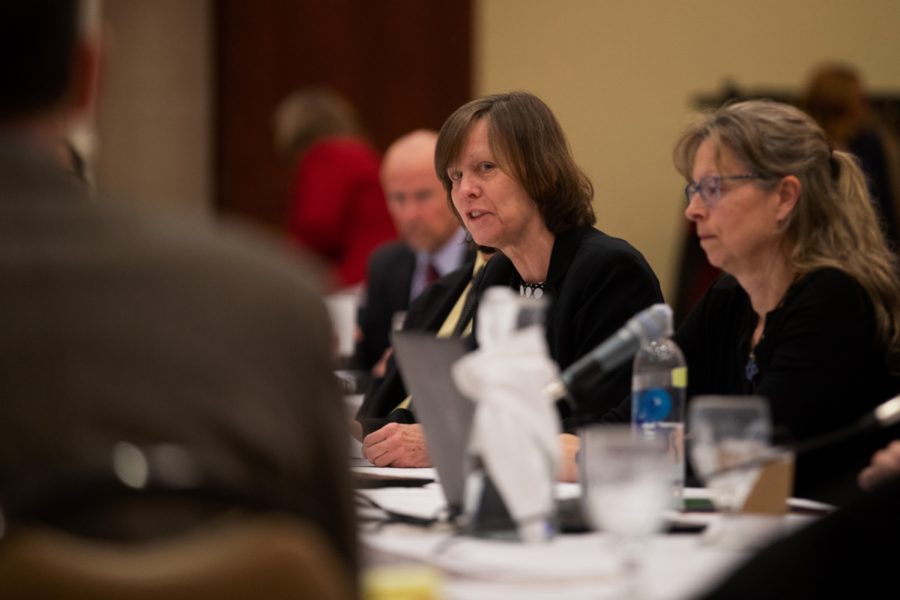UI finances recovering after COVID-19, regent report reveals
At the state Board of Regents meeting on Nov. 9, the UI reported overall revenues at 2 percent above budget projections.
University of Iowa faculty senate president Teresa Marshall speaks during the Board of Regents meeting at the Alumni Center at Iowa State University on April 6, 2021. The Board of Regents looked over requests and plans from the University of Northern Iowa, Iowa State University, the Iowa school for the deaf, and the University of Iowa.
November 9, 2022
University of Iowa’s total operating revenues are 2 percent above what was projected in the budget for fiscal 2022, according to a report presented at the Nov. 9 state Board of Regents meeting.
Rod Lehnertz, senior vice president for finance and operations at the UI, delivered the financial report at the meeting for fiscal 2022. He said revenues are higher than expected, making a surprising rebound from the pandemic.
Lehnertz said COVID-19 made budgeting for fiscal 2022 difficult because the pandemic’s impact is unpredictable, and the school budgeted for lower revenues because of this.
The primary reasons for the increased revenues at the UI are tuition, along with an increase in reimbursements to students, related to high enrollment, he said. The class of 2026 is the third largest in UI history. Additionally, Lehnertz said an increase in research opportunities is one cause of the high enrollment.
Forty-five percent of tuition revenue for fiscal 2022 came from in-state students, while 55 percent came from out-of-state students, according to the report. Lehnertz said the revenue numbers are an indication that there is a large out-of-state appeal at the UI.
“Students from further away other places, like California and Texas and Florida, New Jersey are finding, and certainly the surrounding states, are finding benefit here to give us these enrollment growth numbers out of COVID,” he said.
Lehnertz said the research opportunities also contributed to the UI spending more than expected in fiscal 2022.
“Our increase in research has been really I would say impressive. The team and the college is leading our way and research had been very aggressive to the point of $7.2 million in variance from the budget on that on the research and on the expenditure side,” Lehnertz said.
He also said a significant amount of the UI budget goes toward staff and faculty salaries and benefits. According to the regents’ fiscal report, salary and benefit payments were 66 percent of the expenditures budget in fiscal 2022.
Additionally, the state of Iowa had a warm spring and hot summer, which caused an increase in utility costs due to having cooling systems on longer than usual, Lehnertz said.
According to the regents’ financial report, the UI Hospitals and Clinics’ revenues exceeded the projected budget by 2.6 percent, with expenses exceeding the projected budget by 2.3 percent. Lehnertz said this was also related to COVID-19 as well as supply costs and outreach work.
The report also highlights UI athletics, with expenses landing 8.3 percent over budget in fiscal 2022. Lehnertz said costs are expected to level out because of high ticket sales.
“With a sold-out football season this year, they’re recovering well and getting back to, if you will, a norm and a positive, and the results over budget are showing that they were conservative in their numbers and we’re seeing people interested in coming back,” he said.
UI Housing and Dining have seen a similar dip in revenue, but it is also expected to rise. The only challenge they are facing, Lehnertz said, is the employment market.
“We can have lower expenses, but we are having a really difficult time hiring people into those roles as dishwashers, food servers, cleaners, those kinds of things are very difficult to market right now,” he said. “It’s not sustainable with respect to the 7000 students we have living on campus.”




